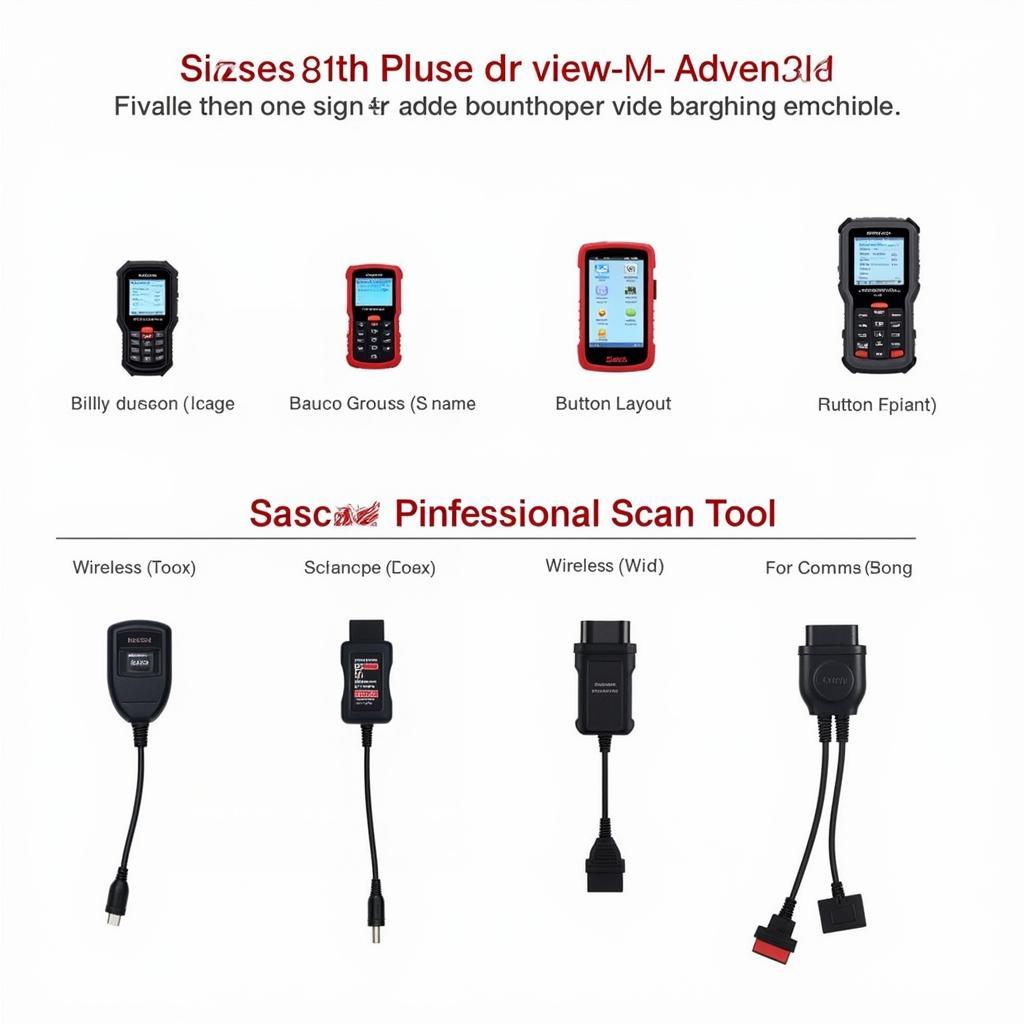Are you intimidated by the thought of using a car diagnostic tool? Many car owners and even some DIY enthusiasts wonder, “is the car’s diagnostic tool hard?” The answer, surprisingly, is: it depends. While professional-grade tools can be complex, many user-friendly options are available for the average person. This article will demystify car diagnostic tools, exploring their functionalities, varying complexity levels, and how to choose the right one for your needs.
Understanding Car Diagnostic Tools
Car diagnostic tools, also known as OBD-II scanners, are essential devices for understanding your vehicle’s health. They plug into your car’s OBD-II port (usually located under the dashboard) and communicate with the car’s computer, retrieving Diagnostic Trouble Codes (DTCs). These codes indicate potential issues within the vehicle’s systems, ranging from minor sensor malfunctions to more serious engine problems.
 Types of OBD2 Scanners
Types of OBD2 Scanners
Having a car diagnostic tool can save you time and money. Instead of rushing to a mechanic for every check engine light, you can quickly identify the problem yourself. This is particularly helpful for diagnosing intermittent issues that might not be present when you take your car to the shop. For dealerships, a good car appraisal tool can streamline their workflow.
Choosing the Right Diagnostic Tool: Simple to Advanced
The difficulty of using a car diagnostic tool depends largely on the tool itself and your technical aptitude. Here’s a breakdown:
Basic Code Readers
These are the simplest and most affordable tools. They can read and clear DTCs, providing a general idea of the issue. However, they typically don’t offer detailed information or advanced functionalities. These are perfect for beginners.
Mid-Range Scan Tools
These tools offer more features than basic code readers, such as live data streaming, which allows you to see real-time sensor readings. They might also offer some bi-directional control, allowing you to activate certain components for testing. While more complex than basic readers, they’re still relatively user-friendly. Need a tool kit to tackle your European car’s electrical terminals? Check out our guide on the european car electrical terminal tool kit.
Professional Scan Tools
These are the most sophisticated and expensive tools, used by professional mechanics. They provide comprehensive diagnostics, advanced functionalities like programming and coding, and access to manufacturer-specific data. These tools require significant technical knowledge and experience to operate effectively. Many mechanics also prioritize maintaining their toolboxes, much like how some detailers pay close attention to snap on tool box care.
Is a Car Diagnostic Tool Worth It for Me?
If you’re comfortable with basic car maintenance and enjoy a bit of DIY troubleshooting, then a car diagnostic tool can be a valuable investment. Even a basic code reader can empower you to understand your car better and potentially save on repair costs. However, if you’re not technically inclined or prefer leaving car repairs to the professionals, a diagnostic tool might not be necessary. If you’re interested in car wrapping, knowing the right tools is crucial. Check out our guide on the essential tools needed for car wrapping.
Common Scenarios Where a Diagnostic Tool is Helpful
- Check Engine Light: Quickly identify the cause of the check engine light without a trip to the mechanic.
- Intermittent Issues: Diagnose problems that come and go, which can be difficult for mechanics to pinpoint.
- Used Car Purchase: Inspect a used car’s diagnostic history before buying.
- DIY Repairs: Monitor sensor readings and other data while performing repairs.
Conclusion: Empowering Yourself with Car Diagnostics
Is the car’s diagnostic tool hard? Not necessarily. With the right tool and a little bit of learning, anyone can gain valuable insights into their vehicle’s health. From simple code readers to advanced professional scanners, there’s a diagnostic tool for every level of expertise. Empower yourself with the knowledge and tools to take control of your car maintenance and save money in the long run. Curious about the tools thieves use? Learn more about what tool do thieves use to break car windows. Dealerships can also benefit from a car appraisal tool for dealerships to enhance their operations.
FAQ
- What is an OBD-II port? The OBD-II port is a standardized connector found in most vehicles manufactured after 1996. It allows diagnostic tools to communicate with the car’s computer.
- What are DTCs? DTCs, or Diagnostic Trouble Codes, are codes that indicate specific malfunctions within the vehicle’s systems.
- Do I need a professional scan tool? Not unless you’re a professional mechanic. For most car owners, a basic or mid-range scan tool is sufficient.
- Can I clear DTCs myself? Yes, most diagnostic tools allow you to clear DTCs. However, clearing codes doesn’t fix the underlying problem.
- How often should I use a diagnostic tool? It’s a good idea to scan your car periodically, especially if you notice any unusual performance issues.
- Are all diagnostic tools compatible with all cars? Most OBD-II compliant tools are compatible with most cars manufactured after 1996. However, there might be some exceptions.
- Where can I buy a car diagnostic tool? Car diagnostic tools are available online, at auto parts stores, and at some electronics retailers.
For further assistance, please contact us via WhatsApp: +1(641)206-8880, Email: [email protected] or visit our office at 910 Cedar Lane, Chicago, IL 60605, USA. We have a 24/7 customer support team ready to help.

Leave a Reply